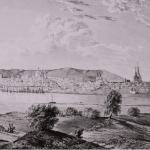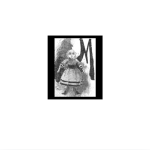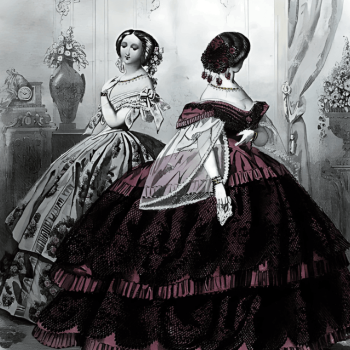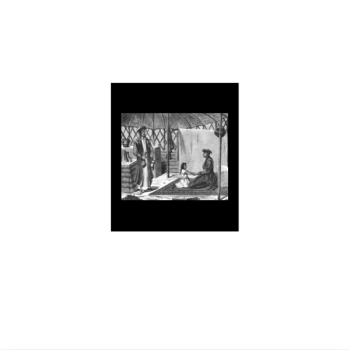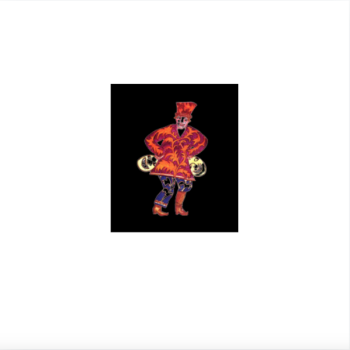This series, “Mothers & Daughters,” is something of a continuation of “Novorossiya.” A closer look at three generations of women of the princely Dolgorukuy family in the late 1830s/early 1840s.
A LANTERN
Winter, 1839.
The night was dark, and the closed wagon rolled gently from side to side. Helena Andreevna held Vera on her lap; one hand holding her head, one hand holding her chest. Lulled by the crawling ride through the snowdrifts, the hushed howls of the wind, and the monotonous exclamations of the driver to the tired horses, she and her girls had drifted off to sleep.
Suddenly Vera woke up but closed her eyes again because a bright strip of light rand across her face.
“What’s this?” Vera asked, jumping up and rubbing her eyes. “What is that, Mommy? A lantern?”
“Yes dear, a lantern,” said Helena Andreevna, smiling. “And look how big the lantern is!”
In front of the carriage was a large building, with bright luminous windows in two rows.”
“Is this a home, mom?! How nice! Who lives there? Is this a station?!”
“No, my child, there will be no more stations,” said Helena Andreevna. “Have you forgotten who we are visiting? This is your grandparent’s house. This is where Dede Andrushka (Andrei Mikhailovich) and Baba Lena (Elena Pavlovna) live.”
“This Dede Andrushka’s house!” All of Vera’s ideas about her grandfather and grandmother were turned upside down at once. It suddenly occurred to her that they must be very rich and important people. This brilliant “lantern” in which they lived must be very similar to the palace of the “Beautiful Princess,” about whom Antonia told her about. “Lelya! Lelya!” Vera shouted. “Wake up! Look where we have arrived. To grandpa and grandma! Get up! Get up!”
“M…m…” Lelya hummed. “Shut up!”
“Don’t be angry,” said Helena Andreevna. “Verochka is telling the truth. We have arrived.”
Everything shook and stirred in the carriage. It no longer seemed dark to them now. The canopy of the tarantass was folded back on one side, and the light and noise of the city streets seemed so magical to them after the silence and snowy darkness. They drove through the stone gates of a large house, which from a distance Vera mistook for a lantern.
On the porch, Aunt Nadya intercepted the girls and dragged them into a crowded hallway. Lelya, Vera, Antonia, Jeffers, and Masha Rugodevskaya (their maid,) were all mixed up their relatives, laughing and crying.[1] Even “Zhuchka”—their friendly black dog—wagged his tail in greeting. Baba Lena, a tall, very plump lady, with a kind and gentle face, hugged Helena Andreevna tightly. Dede Andrushka, a tall, thin, silver-haired gentleman, in a gray frockcoat, joined the embrace. Aunt Nadya and Aunt Katya knelt in front of Lelya and kissed her deeply.
Vera didn’t understand what was going on and turned her back to everyone and gazed at a large man with a mustache who wore a blue jacket with white epaulets and white laces on his chest. He was interesting to look at, and in truth a tad bit frightening to a child of seven. He alone refrained from laughing and stood motionless and quietly near the door.
“Where is Vera?” shouted Baba Lena. “Where is little Verochka?”
“Here she is!” Dede Andrushka shouted, picking Vera up from the floor, and after kissing her several times, handed her into Baba Lena’s arms.
“Butterfly!” said Vera.
That was what all the grandchildren called Baba Lena. Vera assumed that this was probably because Baba Lena was a very smart and learned woman, who, among other things, loved to collect butterflies, knew all their names, and taught the children how to catch them. But butterflies were universally accepted by the Slavs as a symbol of the soul, and the Russian word for butterfly, babochka, was etymologically linked to the affectionate term for grandmother, babushka. It was even said that the babochki that fluttered by were the souls of little grandmothers who had recently passed away. Other Russian dialects were more explicit—naming the butterfly dushechka (a diminutive of dusha, the Russian word for the soul. (It was widely accepted that if the customary alms were not distributed during the funerary rite of panikhidi, the soul of the deceased would reveal itself to their relatives in the form of a moth flying about the flame of a candle.)[2]
“My dear Verochka!” said Baba Lena, hugging her. “Look, how big she has become, my little one! She has grown up and gained weight after the Pyatigorsk waters.”
Vera was staring at the doorway.
“Verochka! What are you thinking about?” asked Helena Andreevna.
Vera leaned back into Baba Lena’s arms and continued to gaze intently at the man in the blue jacket. “Who is that?” she whispered, pointing her finger at him.
Everyone turned in that direction and began to laugh loudly.
“Gendarme Ignatius!” shouted Aunt Nadya, laughing. “What a funny girl! You were scared of the gendarme.”
“I wasn’t scared of him at all!” said Vera with indignation.
Her anger made everyone laugh even more, and she was passed around in a gauntlet of hugs and kisses until she was ready to cry. She was very happy when she found herself under the wing of Baba Lena once more, who sat her down on a high chair next to her. Everyone then started drinking tea and talking cheerfully.
Lelya kept running away somewhere with Aunt Nadya, cheerfully whispering to one another.
Vera drank her warm tea with pleasure and looked very carefully at the large portraits of men and ladies that hung on the wall opposite her. One of the men in the portraits wore a blue frock coat like the Gendarme Ignatius, but he did not sport a mustache, and instead of white epaulets and laces, he had white hair, white lace on his chest, and a large white star. The lady in the portrait next to him had a rose on her shoulder and tall white hair! “Very strange,” she thought. “Why do they all have pink cheeks and gray hair?”
It felt so good, warm! The portraits of her great-grandmothers and great-grandfathers turned into multi-colored circles, with sparkling, flashing patterns that coalesced into a swirl. Vera’s head fell on the table.
“And Verochka fell asleep!” Vera heard someone say as she drifted off to sleep.[3]
-
- MOTHERS & DAUGHTERS
- A LANTERN
- CHRISTENING OF THE DOLL
- DASHA & DUNYA
- GRUNYA
- NANNY NASTYA
- NANNY’S FAIRYTALE
- CONFESSION
- IN THE MONASTERY
- PREPARATIONS FOR THE HOLIDAY
- EASTER
- THE DACHA
- THE MELON POND
- MIKHAIL IVANOVICH
- THE WARLIKE PARTRIDGE
- LEONID
- NEW WINTER
- HISTORY OF BELYANKA
- THEATRES AND BALLS
- YOLKA
- REASONING
- ROAD
- CAMP
- IN NEW PLACES
- THE GRAY MONK
- VARENIKI
- THE TRIP TO DIKANKA
- WHAT HAPPENED IN THE DOLL HOUSE
- ANTONIA’S STORY
- “A WINTER EVENING”
- THE BLACK SEA
- CRIME AND PUNISHMENT
- PANIKHIDA
- PRINCE TYUMEN
SOURCES:
[1] Masha’s last name is given in: [Zhelihovskaya, Vera Petrovna. “Inexplicable And Unexplained. Pt. I” Rebus. No. 43–48 (October 28, 1884–December 2, 1884); Zhelihovskaya, Vera Petrovna. “Inexplicable And Unexplained. Pt. II.” Rebus. No. 4–7 (January 27, 1885–February 17, 1885); Zhelihovskaya, Vera Petrovna. “Inexplicable And Unexplained. Pt. III.” Rebus. No. 9–11 (March 3, 1885–March 17, 1885); Zhelihovskaya, Vera Petrovna. “Inexplicable And Unexplained. Pt. IV.” Rebus. No. 13–14 (April 7, 1885–April 14, 1885.)] [Preparation of the text and comments by A.D. Tyurikov. Bakhmut Roerich Society.]
[2] Ralston, W. R.S. The Songs of the Russian People: As Illustrative Of Slavonic Mythology And Russian Social Life. Ellis & Green. London, England. (1872): 117.
[3] Zhelihovskaya, Vera Petrovna. How I Was Little. A. F. Devrien. St. Petersburg, Russia. (1898): 1-6; Zhelihovskaya, Vera Petrovna. My Childhood. A. F. Devrien. St. Petersburg, Russia. (1893.) [Preparation of the text and comments by A.D. Tyurikov. Bahmut Roerich Center.


